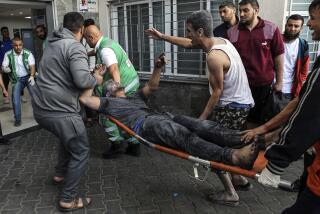A Leader for Perilous Times
- Share via
George W. Bush’s approval ratings are at a low. Some liberals, reports New Republic Editor Jonathan Chait, find Bush’s very existence to be “a constant oppressive force in their daily psyche.” Now even conservatives -- such as columnists George Will, David Brooks and Robert Kagan -- are pouring forth despair over the president’s Iraq policies.
But my admiration for the man -- for whom I refused to vote in year 2000 -- grows ever higher.
A president’s chief duty is to keep the nation safe in the dangerous tides of international politics. In 2000, I found candidate Bush too little engaged with this challenge. But since 9/11, he has offered the kind of leadership that ranks him with the greatest presidents of my lifetime, Harry Truman and Ronald Reagan.
Like them, Bush is taxed with having a weak intellect and little mastery of policy details. Maybe so. But what Bush has, as they had, is a clear-eyed recognition of a great threat to our country, the courage to face that threat and a willingness to risk his political standing for the policies he deems essential to our security.
Sept. 11 was a watershed, but it was new only in scope, not in kind. For three decades, Middle Eastern terrorists had assassinated our diplomats, brought down our airliners, blown up our servicemen in their bunks and berths. They even bombed the World Trade Center. Yet as long as they were killing us in small batches, we responded with passivity, fearing to stir up more trouble.
Even Reagan, tough as he was, decided to slink away when Hezbollah murdered 241 of our Marines in their barracks in Beirut.
On 9/11, however, the terrorists managed to kill us by thousands at a swoop, and what Bush understood was that our policy of passivity, like the West’s efforts to appease Hitler in the 1930s, had only invited more audacious attacks. He saw that we had no choice but to go to war against the terrorists and their backers. If we did not destroy them, the terrorists would set their sanguinary sights higher until they succeeded in killing us by the tens or hundreds of thousands.
He saw too that this war would be, as President Kennedy described the Cold War, a “long, twilight struggle” waged on many fronts and by many means. This meant that we would fight and some of us would die on his watch, but that victory could not possibly be achieved within so short a time as to enable him to claim credit.
Has our occupation of Iraq gone smoothly? Far from it. Have mistakes been made? No doubt.
Probably we should have sent more soldiers, not disbanded the Iraqi army, planned earlier elections and not adopted an artificial deadline for transferring sovereignty.
In the occupation of Japan we made mistakes too: trying to impose federalism, which was alien to the Japanese; purging so many collaborators with the old regime that it crippled economic recovery and stirred deep resentment.
Perhaps even the decision to take on Iraq after Afghanistan was a strategic mistake in the larger war. It might have been better to have concentrated on overthrowing Iran’s mullahs or forcing Syria out of Lebanon. In World War II, Allied leaders and commanders debated fiercely which fronts to concentrate on and in what order.
But the real issue is not about tactics or even the larger strategy but whether to fight at all. The alternative is to soothe ourselves with half measures -- tightening borders, tracking funds, sharing intelligence, courting unfriendly governments -- hoping against hope that a disaster even bigger than 9/11 will not be visited upon us.
Are we safer now than we were before we began to fight back against the terrorists? Perhaps not, just as we were not safer when we began to resist Hitler, prompting him to declare war on us. Back then, we were not safer until we had won. And we will not be safe now until we have defeated the terrorists and their backers.
Would some other president have made the same brave choice as George Bush to shoulder this “long twilight struggle”? Not Bill Clinton, whose eye was always on the electoral calendar. Not the elder Bush, who didn’t think much of “the vision thing.” And surely not John Kerry, who tells us that he voted against the Iraq war of 1991 although he was really for it and voted for the Iraq war of 2003 although he was really against it. Kerry offers, in short, all the leadership of a whirling dervish. Truman? Reagan? Perhaps. But 9/11 came when George W. Bush was in office. He has risen to the challenge of a vicious enemy. I wish I could vote for him twice this time -- to make up for having underestimated him so badly in 2000.
More to Read
Get the L.A. Times Politics newsletter
Deeply reported insights into legislation, politics and policy from Sacramento, Washington and beyond. In your inbox three times per week.
You may occasionally receive promotional content from the Los Angeles Times.










